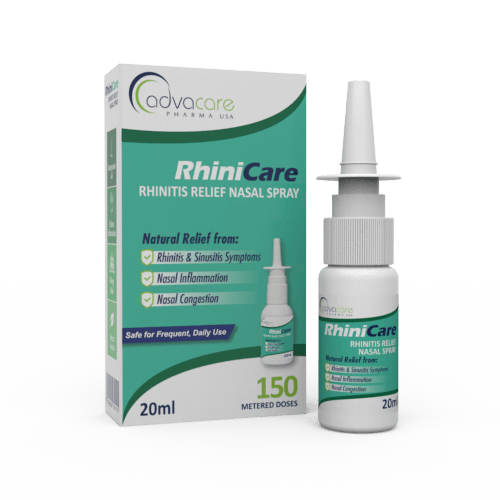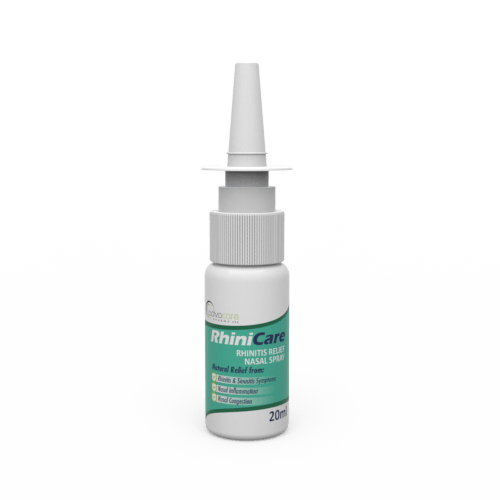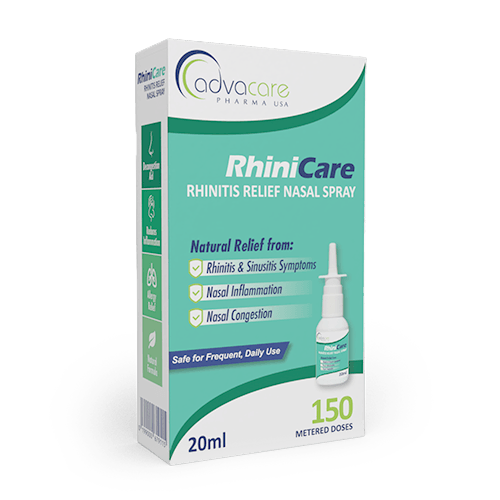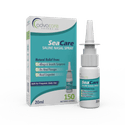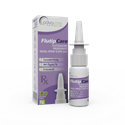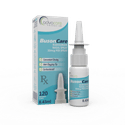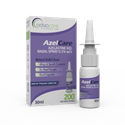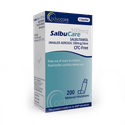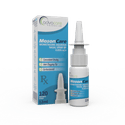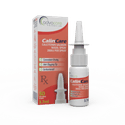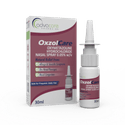- Home›
- Pharmaceuticals›
- Nasal Sprays›
- Rhinitis Nasal Spray
Rhinitis Nasal Spray
Dosage
Packaging
What is Rhinitis Nasal Spray?
Active Ingredients: Purified water, Propolis, Honeysuckle Magnolia, Angelica, Saposhnikoviae Root, White Mulberry Root, Paeoniae Rubra Root, Menthol
Rhinitis Nasal Spray is an all-natural remedy used to relieve nasal symptoms like congestion, itchy or runny nose, and sneezing. This nasal spray combines seven herbs and plants that have been shown to help temporarily reduce symptoms associated with allergies, sinusitis, hay fever, and the common cold.
This formulation contains the following active ingredients: • Propolis: a compound similar to the resin that is made by bees. This product is known for its antibacterial, antifungal, and antiviral properties. It helps clear nasal passageways. • Honeysuckle Magnolia: a plant that helps support sinus function. It helps reduce nasal congestion by constricting blood vessels within the nasal passage. • Angelica: a herb that works as an expectorant. It helps thin the mucus lining and clear nasal passages. • Saposhnikoviae Root: a perennial herb that is also known as "siler root". It exhibits anti-inflammatory, analgesic, and antioxidant properties. • White Mulberry Root: a herb that helps clear loosen and clear phlegm. • Paeoniae Rubra Root: a herb that decreases secretion of certain chemicals in the nasal passageway, which helps reduce inflammation. • Menthol: a widely-used remedy that narrows blood vessels in the nose area, which helps relieve congestion.
The Rhinitis Nasal Spray is specially formulated to address multiple aspects of nasal discomfort and symptoms. The synergistic effect of these ingredients targets not only the relief of symptoms but also addresses underlying inflammation and irritation in the nasal passages.
Propolis, with its antimicrobial properties, helps in reducing the bacterial load, which can be beneficial in secondary bacterial infections that often complicate allergic rhinitis or sinusitis. The inclusion of anti-inflammatory components like Saposhnikoviae Root and Paeoniae Rubra Root further helps in reducing nasal swelling and irritation, common in allergic responses or sinus inflammation.
Honeysuckle Magnolia and Menthol are known for their vasoconstrictive properties, which help reduce blood vessel swelling in the nasal passages, thereby alleviating congestion. Angelica and White Mulberry Root contribute expectorant qualities, aiding in the thinning and expulsion of mucus, which is a common symptom in conditions like sinusitis and the common cold.
AdvaCare Pharma is a producer and exporter of Rhinitis Nasal Spray. We offer a wide range of high-quality and cost-effective medications that are available for global distribution.
Users should understand that while these natural ingredients offer symptomatic relief, they do not cure underlying conditions and should be used as part of a comprehensive approach to managing nasal symptoms.
Why choose us as your Rhinitis Nasal Spray manufacturer?
AdvaCare Pharma, an American pharmaceutical company, manufactures Rhinitis Nasal Spray at our GMP-certified facilities. We are committed to manufacturing more than 500 cost-effective, high-quality medicines that meet the highest industry standards and are readily available to patients worldwide. As an experienced Rhinitis Nasal Spray manufacturer, our global reach extends to over 65 markets where we supply a comprehensive range of 15+ nasal sprays to pharmaceutical distributors, pharmacies, hospitals and government institutions.
Uses
What is Rhinitis Nasal Spray used for?
It is used to temporarily relieve symptoms like nasal congestion, itchy or runny nose, and sneezing.
How is Rhinitis Nasal Spray used?
This medicine has been manufactured as a liquid, which is packaged in a metered spray bottle. It is intended to be applied directly in the nose.
To use, blow your nose before gently inserting the tip of the bottle. Do not insert deep into the nasal passage. Tilt head back and spray once. Repeat for the other nostril. Wipe down the tip before replacing the cap.
What dose should be given?
The usual dose is 1 spray per nostril.
Refer to a doctor or pharmacist for guidelines on dosage.
Can Rhinitis Nasal Spray be used by individuals with asthma?
Users with asthma should exercise caution. Some ingredients in the spray might potentially irritate the respiratory tract or exacerbate asthma symptoms. Asthmatic individuals should consult a physician before using this nasal spray to ensure its safety in their specific condition.
Are there any known drug interactions with Rhinitis Nasal Spray?
This medication may interact with certain drugs, including but not limited to promethazine, blood thinners like warfarin, fish oil supplements, hormone medications, and other herbal remedies or supplements. These interactions may alter the effectiveness of the nasal spray or the concurrent medications. Discuss with a healthcare provider before using the spray if you are on any other treatment.
How quickly does Rhinitis Nasal Spray take effect?
The onset of action can vary among individuals. Users may begin to experience relief from nasal symptoms within a few minutes of application, with the full effect usually occurring within 30 minutes to an hour after use.
How does Propolis in Rhinitis Nasal Spray help?
Propolis, a resin-like substance produced by bees, is incorporated for its antibacterial, antifungal, and antiviral properties. In the spray, Propolis helps in clearing the nasal passages of pathogens. Its use aims to contribute to the overall reduction of infection risk and improvement of nasal hygiene.
Does Rhinitis Nasal Spray have a decongestant effect?
Yes, ingredients like Menthol and Honeysuckle Magnolia have vasoconstrictive properties that help in relieving nasal congestion. They work by narrowing blood vessels in the nose, reducing swelling, and easing breathing.
Can Rhinitis Nasal Spray help with sinus headaches?
While it is not specifically formulated to treat sinus headaches, its decongestant properties may indirectly provide relief. By reducing nasal congestion and sinus pressure, it can alleviate some of the discomfort.
Is Rhinitis Nasal Spray safe during pregnancy or breastfeeding?
Its safety during pregnancy or breastfeeding has not been conclusively established. Due to the lack of comprehensive research on the effects of its herbal ingredients on pregnant or breastfeeding women, simply avoid use or consult with a healthcare provider before treatment.
What should be done in case of an accidental overdose?
In case of an overdose, which might involve excessive or frequent use beyond recommended levels, discontinue use and seek medical advice. Overdose symptoms may include increased nasal irritation or other adverse reactions.
Is Rhinitis Nasal Spray suitable for long-term use?
Prolonged use of any nasal spray can potentially lead to rebound congestion or dependency. Use it as directed for short-term relief, and consult a doctor to address any nasal conditions that may require a longer regimen.
Can Rhinitis Nasal Spray cause dryness in the nasal passages?
While not a common side effect, some users may experience dryness in the nasal passages as a reaction to certain ingredients in the product. If dryness occurs, reduce the frequency of use or consult a doctor for alternative interventions.
Is Rhinitis Nasal Spray effective in treating viral infections like the common cold?
While it can help alleviate symptoms associated with the common cold, it does not treat the viral infection itself. The relief provided is symptomatic, helping to ease discomfort during the course of the cold.
Can Rhinitis Nasal Spray be used as a preventative measure for nasal allergies?
It is primarily designed for symptomatic relief, but its use at the onset of allergy symptoms may help manage their severity.
Will using Rhinitis Nasal Spray affect one's sense of smell or taste?
This is highly unlikely because this product is all made of natural ingredients. Loss of smell or taste is only common in nasal products that contain corticosteroids, oxymetazoline, or phenylephrine. But if any such side effect is felt while using this Rhinitis Nasal Spray, seek medical guidance immediately.
How should Rhinitis Nasal Spray be stored?
Store the spray at room temperature, away from direct sunlight and moisture. Keep the bottle upright and the cap securely closed when not in use. Do not freeze the nasal spray, and keep it out of reach of children.
Side Effects
As with all pharmaceuticals, some unwanted effects can occur from the use of Rhinitis Nasal Spray.
Stop treatment and seek immediate medical attention if the following develop:
- signs of an allergic reaction
- severe burning, sting, or irritation
- pain, swelling, or blistering in the nose.
For a comprehensive understanding of all potential side effects, consult a medical professional.
If any symptoms persist or worsen, or any new symptoms appear, please call your doctor.
Prolonged or excessive use of this spray can lead to changes in the nasal flora, possibly resulting in a condition known as rhinitis medicamentosa, characterized by chronic nasal congestion.
Users should also be vigilant about the sterility of the spray bottle to prevent potential infection. The spray should not be shared with others to avoid cross-contamination.
Precautions
Do NOT use Rhinitis Nasal Spray if: • You are allergic or hypersensitive to any of the ingredients.
This medication may not be suitable for people with certain conditions, including:
- asthma
- blood-related conditions such as clotting disorders or blood dyscrasias
Do not use this medication while pregnant or breastfeeding. Consult a doctor or healthcare professional before treatment.
Some drugs known to interact include medicines like promethazine, blood thinners such as warfarin, fish oil, hormone medications, and other herbs and supplements.
The cautious use of Rhinitis Nasal Spray is essential due to potential interactions and contraindications. Individuals with asthma or blood-related conditions should be particularly cautious, as some ingredients may exacerbate these conditions.
For example, the vasoconstrictive properties of certain ingredients might affect blood flow and pressure, which could be problematic for those with blood circulation disorders.
References
The Potential Use of Propolis as a Primary or an Adjunctive Therapy in Respiratory Tract-Related Diseases and Disorders: A Systematic Scoping Review
Propolis has been used to treat many ailments related to respiratory diseases and disorders. The main objective of this study was to present a systematic scoping review and evaluate the experimental evidence to support the use of propolis.
It included 158 research publications from different databases and included studies with pathogenic infection-related diseases, inflammatory disorders, and lung cancers.
The conclusion from all publications was that propolis has therapeutic benefits in various in vitro studies, in silico studies, and human and animal trials. This shows that propolis is effective either as a primary or adjunctive therapy in the treatment of respiratory diseases.
Propolis as lipid bioactive nano-carrier for topical nasal drug delivery
Propolis contains flavonoids, phenolic acids, and esters and it is used as a lipid material to prepare solid lipid nanoparticles (SLNs) for topical intranasal therapy. It is used as a bioactive medication and propolis concentration affects the nanoparticle properties. The propolis amount and surfactant concentration represent the key parameters that affect nanoparticle properties.
In vitro and ex vivo studies show that neither the drug nor polyphenols can cross the membranes while propolis-based SLNs could serve as effective delivery systems for diclofenac and flavonoids, specifically for the localized treatment of nasal cavity diseases.
The conclusion of this study is that due to its composition, the propolis-based formulation could be used as a bioactive medication, where the carrier itself provides a complementary effect alongside the loaded drug in topical medications like nasal sprays.
You might be interested in...
Why AdvaCare Pharma?
As an industry leader, we are aware of our responsibility to provide affordable and sustainable solutions to improve healthcare worldwide.
